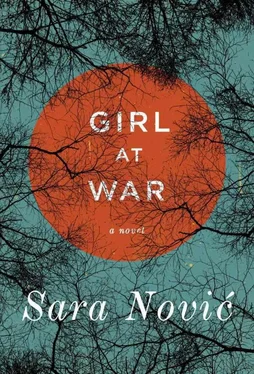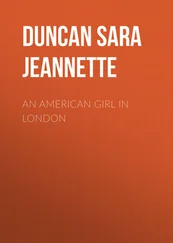The officer stamped my passport and sent me onward, and the flight attendant said goodbye. At the baggage carousel I found my suitcase and followed everyone else toward a set of glass doors. The doors looked sealed, with no knobs or handles, but no one else seemed to notice. I thought about yelling out that everyone should be careful, but couldn’t think of how to say it in English. As the first people pushed ahead I narrowed my eyes, anticipating a spray of broken glass. But the doors slid open at the last minute, like magic.
On the other side, groups of excited loved ones clustered around the opening. A little boy attached himself to his mother’s leg; two friends hugged and jumped and screamed in one another’s ears. Beyond them, men in suits bearing signs with people’s names ringed the lobby. I continued through the crowd, head tilted to compensate for the swirling feeling inside me, until I ran right into a man holding a toddler who looked like my sister.
The man looked down, and for a moment it was unclear which one of us was more terrified. The woman beside him — who was holding a handwritten sign bearing my name with diacriticals in odd places — shuffled through a handful of paperwork. She was short and tan, and her face was set in a smile.
“Rahela?” I peered up at the healthy, curly-haired little girl perched in the crook of the man’s arm. She’d grown so much she was almost unrecognizable, except around the eyes, where we had always looked alike.
“I thought the airline was supposed to bring you — well—” The woman found the paper she was looking for. “Dobrodošli u Ameriku, Ana,” she read haltingly from her sheet.
“Hvala.” I searched again through my school lessons for any English words that would fit together and make sense. The woman bent down and hugged me.
“It’s so nice to meet you,” she said.
Their names were Jack and Laura, and they said it was okay for me to call them that. But Rahela called them Mommy and Daddy in her high-pitched toddler voice, and for the first few months, I called them nothing at all.
—
I changed trains in Trenton and fell asleep in a saggy leather SEPTA seat. I dreamt of bodies. They were nightmares I’d had years ago, when I first arrived in America. Dreams in which I’d be cliff-diving from the rock ledges in Petar and Marina’s fishing village and, in a midair exchange, was no longer headed for the warm Adriatic but was instead careening toward a pile of bloated corpses. Then, as I was landing, a powerful tingle radiated from my neck to the backs of my knees and jolted me awake. The train pulled into the station and the conductor yelled, “Last stop!” and I gathered my things.
On the platform I watched the train ready itself for reversal, part of me already wishing I could go back with it. I trudged down the town’s main thoroughfare, lined with interconnected strip malls: a two-story pet supply, the Kmart where I worked summers, all the major fast-food chains, and Vacuum Mania.
Sometimes I felt guilty that Jack and Laura had moved here for Rahela and me. I wondered if they ever missed their life before us. For years they, too, had been city dwellers, their apartment just enough for newlyweds and the baby they couldn’t have. Then Rahela arrived, and soon she was rosy-cheeked and growing, toys and clothes brimming from her allocated chest of drawers, annexing the arms of furniture. Of course they knew they’d have to give her back. But with her presence they began to want the things they’d always dismissed as the desires of people older than they were. They bought a cheap piece of land on a hill that was going to become a neighborhood, and began to build.
When construction started I was nothing to my American parents but the older sister mentioned in Rahela’s MediMission fact sheet. Then, before the building was finished, I was there.
“Which bedroom do you want?” Laura asked me on move-in day. The thought of my own bedroom was an alien concept and I defaulted to silence, thinking I’d misunderstood. In the end I picked the room with the bigger window because it reminded me of the balcony in Zagreb. The hill overlooked acres of farmland and, beyond that, forest. When family and friends came to visit the new house, all of them remarked on the beautiful view. But in those first months I spent each day searching the skyline for a building, craving something dirty or metal to break through the dark green. I never got used to the forest, not after months or years, not even in daytime, when the sunlight passed through the leaves. I made up excuses to withdraw from neighborhood games of Manhunt that ventured too close to its edge. At night the trees seemed to lean inward, casting shadows on my wall. They were chestnut oaks, Jack said, when I asked him after some sleepless night of tracking their silhouettes out my window. Like in Stribor’s forest, I tried to tell myself, but I could think of nothing but the white oaks and rotting acorns in the place my parents had fallen.
America was not what it looked like in the movies. I had been right about the McDonald’s at least; they were everywhere. But the bravado and gallantry, that spirit of adventure touted in the Westerns so loved across Yugoslavia, was absent in the life I found in Gardenville. In Zagreb I had always been excited about a trip in the car. In Gardenville you needed the car to do anything, even to buy groceries. There were no bakeries anywhere. Everything in the supermarket was presliced and prepackaged. In stores bigger than any I’d ever seen in Europe, stores that had everything, I followed Laura around incredulous that I could not find a fresh loaf of bread.
The culture was noticeably conservative, even in juxtaposition with the dual traditions of communism and Catholicism back home. In Croatia, topless women graced the covers of most newspapers and were common on the beaches, but in America nudity of any kind was something shameful. In Zagreb I ran the streets without curfew and bought cigarettes and alcohol for the grown-ups. In Gardenville, adults nursed a perpetual fear of kidnappers, and I stayed close to home.
Conversations, particularly with respect to me, were crafted carefully. After those initial bursts of curiosity, no one spoke to me about my past, even within the family. Laura developed euphemisms for my “troubles,” the war and its massacres reduced to “unrest” and “unfortunate events.”
Throughout that first summer I passed the days clinging to Rahela, which was harder now that she could walk. I sat in a tiny chair and pretended to eat the plastic food she prepared in her plastic kitchen, or followed her up and down the driveway in her Flintstoneesque foot-powered toy car, unwilling to let her out of my sight. Sometimes I whispered to her in Croatian, to see if she remembered. She’d parrot back a word or two, but the things she babbled of her own accord sounded like English.
When it was time for her nap I’d hide in the crawl space beneath the porch and look at her picture books, practicing English, matching the illustrations to words. Sometimes I scoured the newspaper for any headlines with “Croatia” or “Serbia” in them, which I pasted in a notebook I hid beneath my bed. When Laura could will me out into the open, she’d speak to me loudly, as if volume was the reason I couldn’t understand. Having studied English all my school days, I could comprehend most of what she said, but struggled to summon the right words in the right order fast enough to respond. She bought me summer school workbooks, and I powered through the math problems and guessed on all the reading fill-in-the-blanks until I had completed enough pages for her to declare me finished. Then I’d return to my spot beneath the porch and fight the urge to sleep. I stayed awake most nights and was always exhausted, but sleep meant dreaming, and so I avoided it.
Читать дальше












